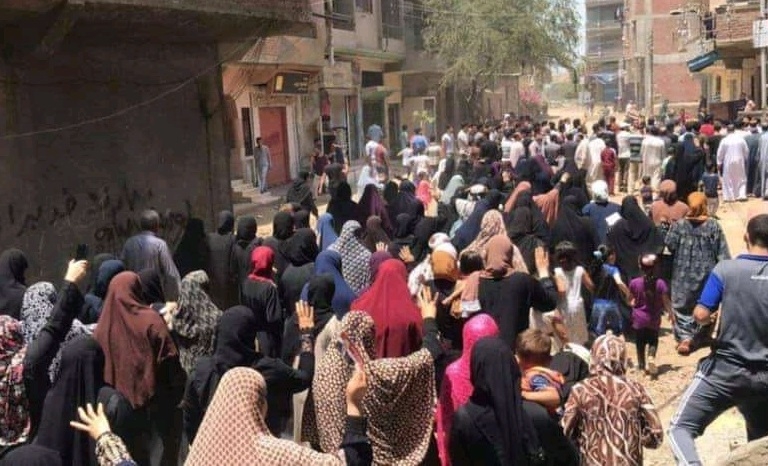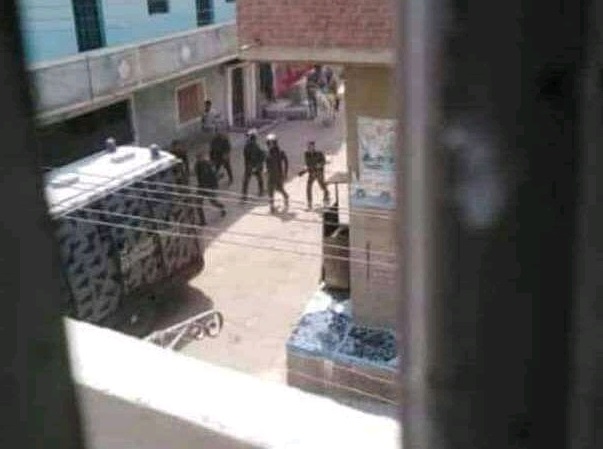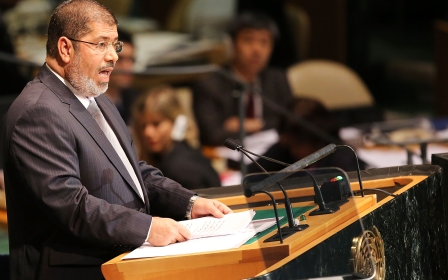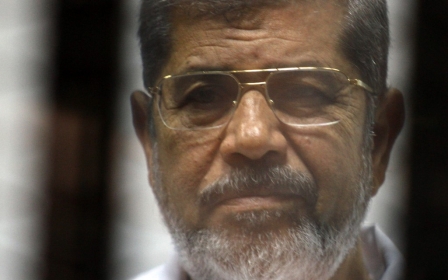‘A funeral with no body or coffin’: How Morsi’s hometown observed his death

As news spread to El-Adwah that deposed Egyptian president Mohamed Morsi had died on Monday, residents in the Nile Delta village he called home began funeral preparations.
But within two hours, plain-clothed police officers were checking all microbuses and cars at checkpoints that had popped up around the village.
El-Adwah, which only made the news when Morsi ran for president in 2012, had turned from a place of mourning into a military zone, triggering minor acts of spontaneous protest which continued into Tuesday.
New MEE newsletter: Jerusalem Dispatch
Sign up to get the latest insights and analysis on Israel-Palestine, alongside Turkey Unpacked and other MEE newsletters
As armoured vehicles and dozens of riot police roamed the streets, the village’s state-run El-Adwah Mosque, the main mosque which once served as a meeting point for anti-coup protests, refused to play Quranic recitations to observe Morsi’s death.
Multiple sources told MEE on Tuesday that the Egyptian government's religious authority issued a warning to imams and preachers, instructing them to avoid funeral prayers for anyone in mosques throughout the country.
'We didn’t think that the dispute with the government would reach this low level'
- Sayed, friend of Morsi's family
In recent years, thousands of Egyptian mosques have hired goverment employees from the Ministry of Endowment to ensure that no political discourse would be shared within mosques, a main centre for political mobilisation after the 2013 coup.
So residents played cassette tapes out of their windows instead.
Eventually, they learned that authorities had refused to allow Morsi to be buried in El-Adwah, and he would be laid to rest in a Cairo cemetery while security forces watched.
“We prepared to stage a funeral for the president and to silently take him to his last place of rest,” Sayed, a friend of Morsi’s family who declined to use his last name, told Middle East Eye.
“We didn’t think that the dispute with the government would reach this low level - preventing people from burying a dear one.”
Sadness turns to frustration
As the evening continued, locals grew more frustrated when around 30 worshippers were stopped from holding an Islamic funeral prayer at the same state-run mosque.
“The imam and mosque workers rushed to kick us out of the mosque,” said Mohamed, a young doctor from the village.
“We don’t need the state’s mosques. Worshippers have already held funeral prayers in Al-Aqsa Mosque and in Mecca for him.”
Mohamedy, a 47-year-old teacher who was among those trying to hold the prayer, told MEE that many in the village had been hopeful when Morsi was elected.
“He and his family look like millions of Egyptians: hard working, middle-class people who travelled to gain an education in the West and came back to benefit the country. He was not a judge, an officer, or a businessman,” he explained.
“He was a man that was down to earth and humble. When he was elected, we felt that a normal hard-working man was going to be president.”
Mohamedy said that he and others were incredibly sad about Morsi’s death, but also frustrated that they were prevented from fully mourning.
'He was killed in a courtroom where the judge is heartless and knows nothing but vengeance and oppression'
- El Adwah lawyer
“We can’t even gather in a house and recite the Quran as the village now is full of informants. If this is known, many might be arrested,” he said.
Another local who works as a lawyer, but refused to be named, said in any political dispute, there should still be respect for death.
“He was killed in a courtroom where the judge is heartless and knows nothing but vengeance and oppression,” he said.
Later in the evening, an angry crowd gathered against at the mosque, chanting “Al-Sisi killed Morsi” and “The martyr is now in heaven”.
The demonstrators were met by resistance by a group of pro-army supporters, leading to a minor argument that dispersed quickly.
A 24-year-old employee at a real estate company who watched the dispute said he was not a Morsi supporter. But he still couldn’t believe the stark contrast of Morsi’s treatment in prison compared with that of former president Hosni Mubarak who was ousted after protests in 2011.
“One was denied insulin while the other was given military salutes and served coffee in the courtroom’s detention cage,” he said.
“Whether we defer to Morsi, we should admit that his one year was the peak of freedom of press and expression.”
He added: “People are afraid that they are sad because one of their neighbours died. But in several houses, there is a funeral but with no coffin or body.”
On Tuesday, villagers demonstrated, walking in narrow streets that were difficult for the armoured vehicles to access.
Middle East Eye delivers independent and unrivalled coverage and analysis of the Middle East, North Africa and beyond. To learn more about republishing this content and the associated fees, please fill out this form. More about MEE can be found here.




